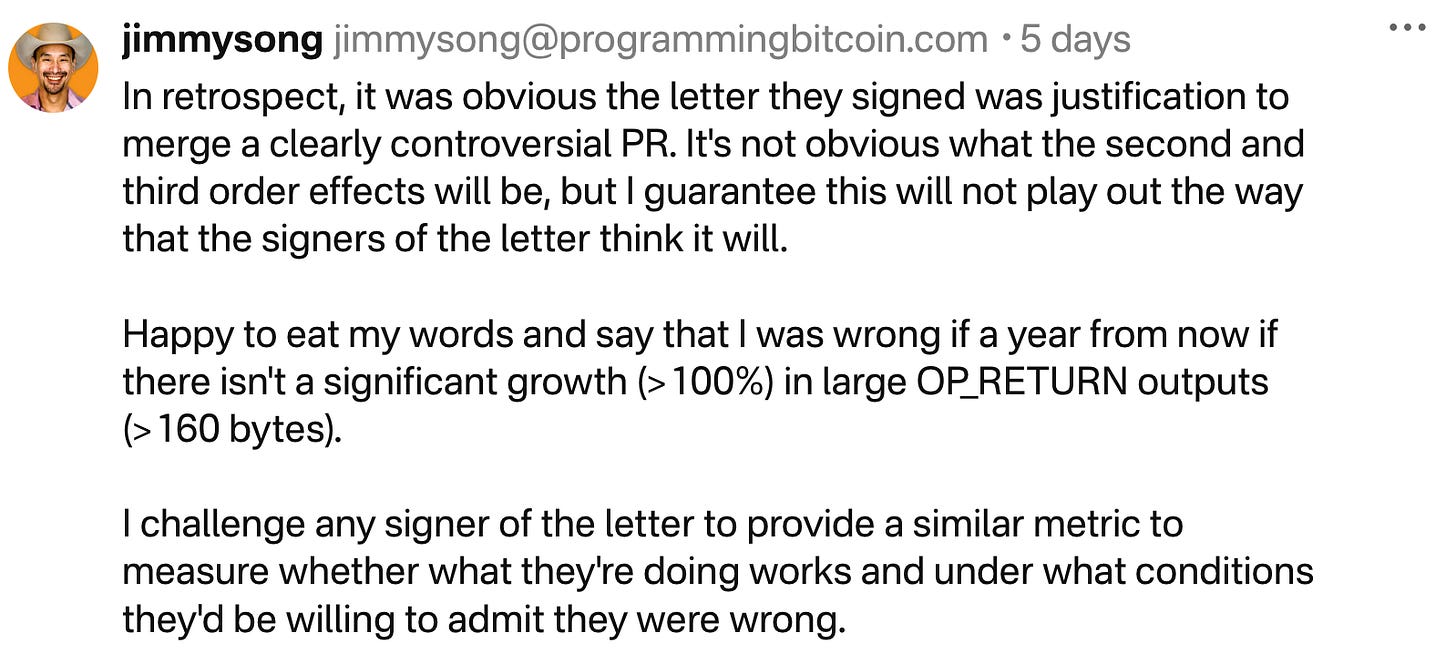Bitcoin Tech Talk #453
Interesting Stuff
Universities as Modern Monasteries - I learned a lot in this essay, particularly about how wealthy monasteries were before essentially being captured by the state, but more importantly, how institutions that seem permanent have a way of disappearing when the incentives change. Such is the contention of this article about the modern day monastery, the 4-year university. The parallels are uncanny, especially when it comes to the accumulated wealth both held at their peak. But incentives are changing, and these once revered institutions don’t have the monopoly that they used to and as such, they’ll most likely shrink significantly. Which is great for the people that want to use these institutions for their original intention, but not so great for the great masses of rent-seekers that have grown on them.
Zombie Christianity - If you’re a Christian, this is one of those articles that hits a little too close to home. There Christianity, the real thing, and the fiat version, which unfortunately has been largely co-opted by politicians, at first with the intention of carrying out Christianity in the political world, then slowly debasing until we get ludicrous policies that resemble Christianity only in platitudes. It’s a good reminder that the corruption of good things is often worse than the straight-up bad things, as fiat money that was once based on gold is much worse than straight-up fiat money.
Re-Thinking WWII - WWII has a special place in our culture. Unlike WWI, Korea, Vietnam, Iraq and Afghanistan, there’s very little skepticism about the war, the motives around it and an absoluteness about the moral quality of the war which is not present in other wars. This article attempts to explain why that is and how that has skewed our perspective on history. As the author points out, the Japanese actually committed some greater atrocities than the Nazis did, yet they don’t have the same historical reputation. And unfortunately, the “lessons” of WWII are almost always used to get us into more wars. In other words, the propaganda of WWII never stopped because it’s useful to those in power.
The Art of Love - Enlightenment ideas have deeply wounded society, being the basis for Marxism, Sexual Liberation, and Post Modernism, among other things. But perhaps the most practical consequence is that of Romanticism and the very modern idea that love is about finding “the one.” This article is a good summary of all that is wrong with that frame of thinking, and likens love to something more like art, which requires a lot of practice and even courage. Love requires work, and increasingly, it’s not something people are signing up for, given the myriad of fiat alternatives that exist for both sexes.
Reversible Computing - I had not even heard of this term until I read this article, but it seems that the tech press and academia has started to hype this particular technology. As the article shows, it’s not nearly the revolution the theorists claim and it’s a lot harder to make than it looks. Like most theoretical hype, the engineering is non-existent and unlikely to produce results that much more studied technologies would with more engineering spending. But academia and the tech press worship at the temple of the new, so they won’t be improving what we know can be improved, instead playing around with impressive-sounding woo. Lastly, it turns out that quantum computing needs to be fully reversible, which is yet another obstacle to its being made real.
What I'm up to
BTC Prague - The biggest European conference of the year starts this week and I’m here for it! There are a lot of satellite events which are conveniently viewable on the Satlantis website. Once again, I’ll be debating Peter Todd on the long-term security budget and giving a talk on what sort of valuation metrics make sense for Bitcoin.
Seoul - The meetup hasn’t been set up yet, but I’ll be in Seoul in early July and doing a few things in the city with the Bitcoin meetup. There’s also the launch of two of my books in Korean, Thank God for Bitcoin and Fiat Ruins Everything, which should also be fun.
Nostr Note of the Week
What I’m Promoting
Bitcoin
CTV-CSFS - On the heels of the relay policy post on bitcoincore.org, we have this letter signed by a bunch of devs asking for OP_CTV (Check Template Verify) and OP_CSFS (Check Sig from Stack) to be reviewed in the next 6 months. You’ll notice that the signers of this letter and the signers of the Data Carrier Size Removal letter are quite different and surprisingly, there’s not a single overlap between the two lists (though many signers of this letter supported the merge of the change in data carrier size). The mailing list discussion is showing that there’s definitely resistance from the signers of last week’s letter.
Data Carrier Size Change Merged - The controversial change has been merged into Bitcoin Core for the v30 release due later this year. The PR changes the default data carrier size from 83 bytes to 100,000 bytes, which incidentally is the same as the max transaction size for the purposes of relay. The reasoning given by Gloria Zhao in actually merging the change reiterates many of the same arguments that have been going around the last couple of months, namely desiring a similarity in the composition of a node’s mempool and eventual block mined.
Intersection Attacks - Useful article for understanding how CoinJoins are defeated, largely using multiple data sources to reduce the anonymity set. The main way is to find multiple coinjoins that are clustered after the coinjoin and look for similar patterns on the inputs creating a smaller intersection. This is similar to identifying a person given multiple pieces of data like address zip code, gender and shoe size. Enough intersections reduce the number of possibilities quickly to 1, de-anonymizing these coinjoins. As always, privacy is not easy and this is not only coinjoins, but other information that you leak.
Lightning
sats.host - For people that own domain names, hosting a simple website is way more painful than it should be, not just because of the technical process of pointing DNS records and static IP addresses, but because of the payments aspect. This is a service that lets you pay in Lightning for hosting a static website and I’m shocked that this wasn’t thought of before. Most web hosting providers require a lot of KYC info which is quite off-putting, so something like this definitely has a market.
Validation Signing - Lighting transactions require a lot of signing and that means, usually, that the private key has to be online or some sort of signing device has to be available. Unfortunately, that means that the attack surface on the Lightning node is significantly higher, than, say, a cold wallet and this article goes into a mitigation called Validation Signing. The main idea is to have some sort of device that signs with reasonable parameters, making it hard for an attacker that’s compromised the Lightning Node from draining your node of sats. As lightning gains greater adoption, this sort of security measure should become more standard.
Fee Bumping Reserve Exhaustion Attack CVE - Reserves are important in Lightning Channel closing, especially in adversarial conditions as they need to be used for bumping fees in a high fee environment when a transaction needs to get into a block. This class of attack is one where if the reserve amount is guessed, the attacker can essentially exhaust the reserve by attacking during a high enough fee environment and cause funds loss. Interestingly, this may put limits on the “risk free” rate of return by putting funds into routing nodes, as some reserve needs to be kept around to support fee bumping.
Economics, Engineering, Etc.
1/3 - Gemini and Glassnode have released a report showing that about 1/3 of all coins are held by institutions of some kind. This includes companies like Strategy who hold Bitcoin Treasuries, but also exchanges. The main thing I learned from the report is that a lot of the flow of Bitcoin is going from exchanges to ETFs, which should be expected given how much easier it is for trad investors to access ETFs than exchanges.
Opportunity Cost - It’s hard to think in sats when the greater world thinks in fiat money, so this is a browser extension that helps you by auto-converting dollars and cents into sats. This is particularly useful during seasons when Bitcoin is shooting up quickly and gives you an idea of how much purchasing power your sats have. The mental shift to a sats standard has to begin with tools like this, and the more people can think in sats terms, the quicker we’ll get hyperbitcoinization.
SatoshiTop - You can monitor your node via this Terminal app, which gives you a desktop-like interface for all the stats around your node. The idea is that this command is much like the popular Linux command, “top” which gives you a list of processes that are running on your computer. For command-line enthusiasts, this is great, especially for servers that don’t have a desktop GUI.
Quick Hits
1045 BTC - Another week of stacking for Strategy.
Bitcoin Keeper - A phone or desktop based multisig wallet with support for many different devices.
Pomp raises $750M - To start a Bitcoin treasury company.
Bounties - Some Bitcoin bounties you can collect if you get certain things done.
Cold Water on ES - A Bitcoiner explains why he’s moving out of El Salvador.
Fiat delenda est.







